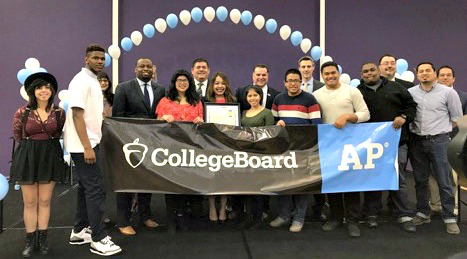A few weeks ago, I had the honor of attending a celebration hosted by the AP College Board to recognize Lynwood Unified School District as they were awarded the 2017 National AP District of the Year Award. This is the highest award given to only three districts nationwide and after five years of a transformational journey, Lynwood received this honor and became the exemplar of why Open Access is important.
From 2010-2016, Lynwood Unified has increased AP Participation by 157%. While this has been the result of a comprehensive plan, the foundational work was laid when open access became the new default. Open access has allowed for any student to enroll in an AP course without needing “permission” or having to “test” into a course. While AP courses are known for being highly selective given the increased course rigor, our district administrators believed that if only students who met specific criteria were allowed to enroll, we would be overlooking some of our brightest kids who may have slipped through the cracks in previous years. While this is a hard reality to accept, our administrators were right.
I witnessed how limited access to AP courses had left some of my own friends behind. Since there were limited courses, we would only be able to take an AP course if we met a specific criteria (grades, test scores, etc). In addition, there were a limited selection of classes to take so some students would be left out simply based on filled classes. While my own educational journey was highly influenced by the fact that I had access to multiple AP classes given my grades (which in turn let me to enroll into college with over 40 units), one of my closest friends did not have the same luck. He was one of the smartest, critical thinkers I knew, but his grades did not reflect his intelligence. Unfortunately, given the grades requirement, he was not able to enroll into the same courses that I had access too.
Fast forward to our current policy, open access has allowed students like my old classmate to not miss out on the opportunity to be challenged in an AP class in addition to getting ahead of the game with the college coursework. Even though I still get some questions about the logistics behind implementing this policy and truly providing all students the same opportunities, I have come across naysayers who worry that open access will take a toll on their “passage rates” since not all students taking these courses are at the same “academic level.” To them, I say this: It is our DUTY and RESPONSIBILITY to eliminate the systematic barriers that have been set in place for years and have led to our current achievement gaps within our schools. These gaps, in essence, are a result of fractures in the educational system and beyond. With open access, we are providing students one more pathway of opportunity to transform their educational journey. School achievement shouldn’t simply be measured with test scores — it should be measured based on the access students are provided.
To those who are still worried that open access can negatively affect school data, I am happy to share that with our increased participation, our AP test passage rates ALSO increased by 13.5%, and this is just the beginning. So take a chance on our future leaders. They deserve to have us do the groundwork to ensure that they face fewer barriers on their journey to fulfilling their dreams.
Alma Renteria
Latest posts by Alma Renteria (see all)
- Rincón Universitario: Cómo Escribir una Narrativa Auténtica para Solicitudes de Universidades, Parte 3 - October 17, 2019
- College Corner: How To Write An Authentic Narrative for College Applications, Part 3 - October 15, 2019
- Rincón Universitario: Cómo Escribir Una Narrativa Auténtica para Solicitudes Universitarias, Parte 2 - October 1, 2019
- College Corner: How To Write An Authentic Narrative for College Applications, Part 2 - September 26, 2019
- College Corner: Cómo Escribir un Relato Auténtico de Solicitudes para la Universidad, Parte 1 - September 4, 2019

